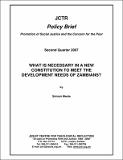What is Necessary in A New Constitution to Meet the Development Needs of Zambians?

View/
Date
2007Author
Mwale, Simson
Type
BriefingLanguage
enItem Usage Stats
54
views
views
10
downloads
downloads
Abstract
There is so much discussion in Zambia about the Constitution, especially with regard to what should be in the new Constitution as the National Constitutional Conference (NCC) meets. The Mung’omba Draft Constitution which the NCC is now deliberating was the one released in December 2005. But unfortunately among the wider Zambian public, there is very little understanding about what should be in the new Constitution and how this will have great consequences for integral and sustainable
human development for everyone. The Zambian Constitution is the supreme or fundamental law of the land. Therefore, it must
be a product of national consensus if it is to command constitutional legitimacy (i.e., inclusiveness and ownership). So it is extremely important for the people of Zambia to understand what should definitely be in the new Constitution. To promote this wider understanding, the Jesuit Centre for Theological Reflection (JCTR) has prepared this Policy Brief to offer input on what should be in the new Bill of Rights of this new Constitution. A key question that should guide our discussion is: “What is necessary in new Constitution to meet people’s developmental needs in Zambia?” In this Policy Brief, the JCTR argues that what is needed for sure is a new Bill of Rights that effectively incorporates Economic, Social and Cultural Rights (ESCR).
Description
There is no doubt that ESCR are necessary for integral and sustainable human development. At least three reasons can confidently be advanced to demonstrate this fact. First, ESCR are about “access” to quality basic social services and will depend on progressive realisation. Second, emerging perspectives on “development” that are about improving the quality of life support the inclusion of ESCR in the Constitution. Third, from the standpoint of the Church’s Social Teaching (CST) on “development”, such rights are indispensable for human dignity and community development.